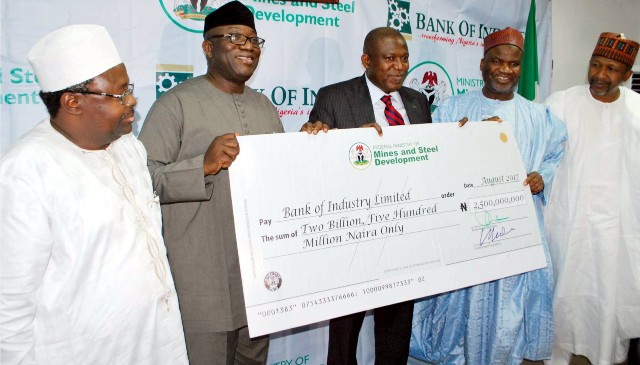Business
FG, BoI Launch N5bn Fund For Small Scale Miners

The Ministry of Mines and Steel Development, in collaboration with the Bank of Industry (BoI), has launched a N5 billion fund in support of artisanal and small scale miners in the country.
Under the arrangement, the ministry would contribute N2.5 billion which would be matched by another N2.5 billion by BoI.
A certified artisanal miner, under the scheme, can access from N100,000 to N10 million while a small scale miner can access from N10 million to N100 million.
A Memorandum of Understanding (MoU) was signed, yesterday by the Minister of Mines and Steel Development, Dr KayodeFayemi, and the Managing Director/CEO of Bank of Industry, MrOlukayodePitan, in Abuja.
Speaking at the event, Dr Fayemi said the development was aimed at addressing the issue of insufficient funding and access to capital, which was a major factor militating against artisanal and small scale miners who accounted for about 80 per cent of activities in the mining sector.
According to the minister, the BoI would serve as the custodian and manager of the fund, which would be given to the artisanal and small scale miners at five per cent interest.
Dr Fayemi said: “This agreement is a meeting of minds between the FMMSD and the BoI. We are in the first instance launching a N5 billion fund. With our ministry’s pilot contribution of N2.5 billion, BoI will match our contribution with another N2.5 billion.
“Consequently, with this agreement, the FMMSD appoints BoI as the custodian and manager of the Nigerian Artisanal and Small-Scale Miners (ASM) Financing Support Fund, for the purpose of financing artisanal and small scale mining projects involving industrial minerals, precious stones, precious metal (gold), dimension stone and such other strategic minerals in Nigeria as shall be approved by the ministry and BoI from time to time.
“The loans would be made available to certified industry participants at a single digit interest rate of 5percent per annum, which is by far about the most attractive within our jurisdiction.
“In addressing the challenge of insufficient fun ding and lack of access to capital, the ministry secured approval for N30billion from the mining sector component of the Natural Resources Development Fund from the FGN. We also secured the World Bank’s approval for $150 million to support the ministry’s Mineral Sector Support for Economic Diversification (MinDiver) programme.
“The Solid Minerals Development Fund (SMDF) is now spearheading the assembling of a $600 million investment fund for the sector, working with entities such as the Nigerian Sovereign Investment Authority, the Nigeria Stock Exchange and others.
The CEO of Bank of Industry, Mr Pitan in his response said the bank was convinced that the fund would step up rapid development in the mining sector, just as a similar funding arrangement administered by the BoI boosted the country’s movie sector.
Business
Two Federal Agencies Enter Pack On Expansion, Sustainable Electricity In Niger Delta

Business
Why The AI Boom May Extend The Reign Of Natural Gas

Business
Ogun To Join Oil-Producing States ……..As NNPCL Kicks Off Commercial Oil Production At Eba

-

 Sports3 days ago
Sports3 days ago2026 WC: Nigeria, DR Congo Awaits FIFA Verdict Today
-
Politics3 days ago
ADC, PDP, LP Missing As INEC Set For By- Elections In Rivers
-

 Environment3 days ago
Environment3 days agoOxfam, partners celebrate 5 years of climate governance programmes in Nigeria
-
Politics3 days ago
FG’s Economic Policies Not Working – APC Chieftain
-

 Politics3 days ago
Politics3 days ago2027: Diri Unveils RHA LG Coordinators, APC Congress Panel
-

 Politics3 days ago
Politics3 days agoReps To Meet,’Morrow Over INEC’s 2027 Election Timetable
-

 Politics3 days ago
Politics3 days agoGroup Continues Push For Real Time Election Results Transmission
-
Sports3 days ago
Sunderland Overcome Oxford Challenge

